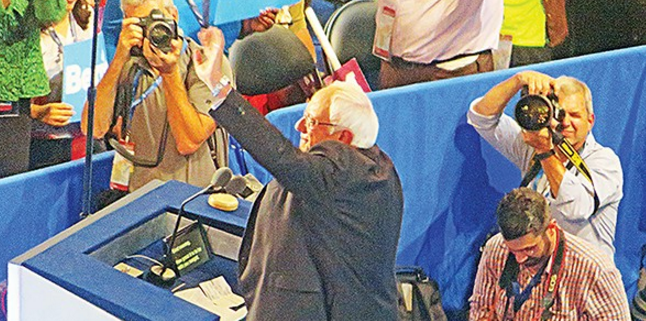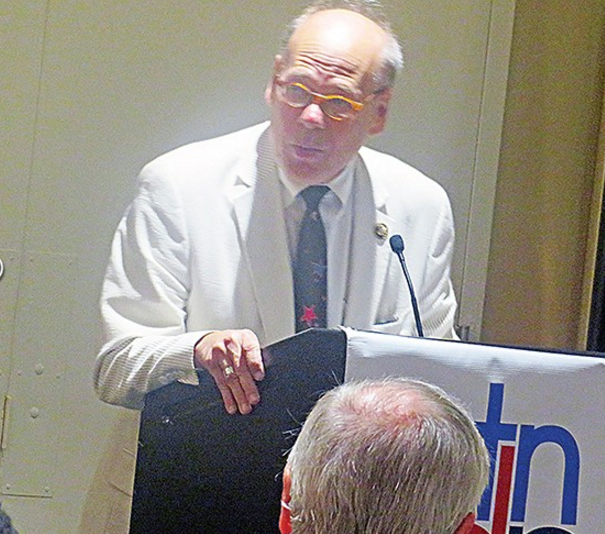
PHILADELPHIA — Unsurprisingly, internal tensions are predominating at this week’s Democratic National Convention — held, ironically, in a city whose name translates from its Greek roots as “city of brotherly love.”
In that regard, the Democrats gathered here face a challenge somewhat similar to one the rival Republicans had to deal with at their own nominating convention last week in Cleveland. In a rough sense, both parties have nominees that a significant part of their membership have doubts about.
In the case of the GOP, that was Donald Trump, the shoot-from-the-lip billionaire and newly minted politician who continues to be anathema to right-of-center Republicans who favored Texas Senator Ted Cruz, as well as a continuing irritant to establishment Republicans in general.
Cruz eased Trump out of his predicament somewhat by making a prime-time convention speech that conspicuously avoided even a wink and a nod toward formally endorsing the nominee. The speech was generally regarded, even by many delegates thitherto loyal to Cruz, as so lacking in elementary class and protocol as to deflate whatever resistance might have been building up against Trump.
The issue in Philadelphia also concerns a case of two rival candidates — former Secretary of State Hillary Clinton, whose nomination for President was a given as the week began, and Vermont Senator Bernie Sanders, the “democratic socialist” whose challenge to Clinton’s inevitability seemed capable of succeeding at several points during their extended Democratic primary contest.

So close was that race, so late was Sanders’ concession to Clinton, that a WikiLeaks release of hacked emails showing what appeared to have been a concerted effort by DNC officials to slant the outcome toward Clinton threatened to cast asunder the party’s tenuous and newfound sense of unity.
Certainly it galvanized the doubts of disenchanted supporters of Sanders and his call for a political revolution, especially the youth brigades that had come to his support during the primary race in numbers huge and enthusiastic enough to recall the reformist fervor of the 1960s.
And those Sanders followers, along with partisans of Jill Stein of the Green Party, Black Lives Matter activists, and various other representatives of the political left, came together in Philadelphia to form a protest contingent so large and potentially unmanageable as to challenge local law enforcement (heavily augmented by police forces from elsewhere, as was the case in Cleveland).
On Monday, as delegates and other conventioneers inside the Wells Fargo expectantly awaited a prime time address by Sanders, thousands of protesters collected in a fenced-in park area, several miles long, adjacent to the arena, where they bore signs and shouted chants decidedly hostile to Clinton and the D.C. — the mildest of which was “Hell No, DNC, We Won’t Vote for Hillary!”
For all that, the Democratic establishment in Philadelphia, like the Republican establishment in Cleveland, caught a break. But, whereas the stroke of fortune fore GOP had come, as indicated, from the churlishness of the dissidents’ potential leader, Cruz, the deliverance from the Democrats was owing to the good will of Sanders, who acquiesced to Clinton’s victory with a strong statement of support for her in his convention speech, coupled with encouragement to his legions to fall in line.
The only potential mischief coming from Sanders was a statement from the dais congratulating his thousand-plus delegates on the convention floor and the glee he demonstrated in anticipating their votes for him during roll-call time on Tuesday night.

The strong Sanders feeling, and the unease of party members regarding the offending DNC emails released by WikiLeaks, could be observed in meetings of the Tennessee delegation, as well.
In a rousing address to the delegation’s Tuesday breakfast meeting at the Radisson Tower hotel in Valley Forge, one of that morning’s featured speakers, 9th District congressman Steve Cohen, minced no words.
Hailing the Sanders delegates in attendance, Cohen, a Clinton supporter, declared, “It was wrong, what the party did,” and said the responsible DNC members should be fired because “they crossed the line.”
But, said Cohen, “Bernie wants you to be for Hillary.”
The congressman also used the occasion to attack the administration of Republican Tennessee Governor Bill Haslam for what he saw as adulterations to the mission and purpose of the state lottery, which Cohen is acknowledged to have been the father of, as a long-time state Senator prior to his election to Congress in 2006.
Cohen criticized Haslam for freezing the maximum amount of the Hope Scholarships subsidized by the lottery at $4,000 per annum, even as inflation has raised in-state tuition rates to levels far beyond that figure, while meanwhile draining off lottery funds to pay for the free community-college tuition grants under Haslam’s Tennessee Promise initiative.
Arguing that those changes had routed money from a scholarship program that was both need-based and merit-based toward a “needless- and meritless-based” pattern of community-college subsidies, Cohen said the Promise program was created “because Bill Haslam wanted to leave office saying he did something,” and he said flatly “Bill Haslam is a terrible Governor.”
Another Memphian making an impact at the convention and elsewhere is District 91 state Representative Raumesh Akbari, who was scheduled to receive on Wednesday the National Juvenile Justice Network’s 2016 Reformer Award for her leadership efforts in juvenile justice reform.
That award was to be part of the Network’s annual forum at the University of Memphis Law School. It was unclear whether Akbari would be able to receive the honor in person, since she began the week as a member of the Tennessee delegation in Philadelphia, where on Thursday, as she will be one of the featured speakers on the main convention stage — one of several chosen to represent her party’s diversity.